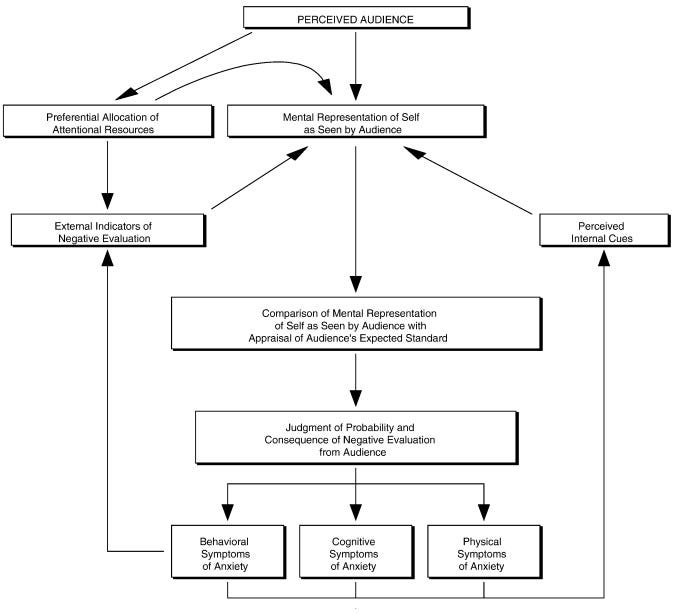The Quickest Way to Reduce The Impact of Social Anxiety
Interventions that Really Work + My Favorite Social Anxiety Discoveries
I previously discussed a new model of how social anxiety arises and in particular, how people who say they don’t care what other people think really, really do…..
Know this - social anxiety can suck but it is a very treatable condition. To help, let me share some incredible scientific findings that have not received sufficient attention.
Attentional Training
When you feel socially anxious, it can feel like you're under constant surveillance, as if a stalker is tracking your every move.
Notice in this figure that an actual audience doesn’t need to be present, it is your belief that people could be observing you that matters (the perceived audience).
Steal My Killer Analogy of the Perceived Audience
Imagine you're strolling down the street, lost in thought, when suddenly, you trip over an uneven sidewalk. Instinctively, you break into a light jog, as if to gracefully recover your dignity. The twist? There's not a soul around to witness your impromptu performance. This awkward, unathletic reaction to an invisible audience highlights how our minds conjure up spectators, influencing our actions even in solitude. It's as if a tiny critic perches on our shoulder, ever-watchful, nudging us to act as though we're always on stage. Embracing this phantom audience, rather than battling it, can transform self-conscious moments into opportunities for better performance.
What Happens In Response to the Perceived Audience
Upon feeling you are under the watch of judgmental eyes, a whole lot of psychological shit starts happening. Most importantly for this conversation, your limited attention is split. No longer can you experience flow and absorption. Nope. You are now:
hyper-sensitive to any evidence of being negatively evaluated (that sigh, yawn, person texting while you’re talking)
excessively self-focused on what is happening in your body, what your mind is saying to you, and making comparisons about what you should/ought to be doing versus what you are actually doing.
This self-monitoring, while subtle, can drain your energy and dampen your mood. However, when you reduce this negative self-focus (and vigilant external search for threats), not only does your social anxiety decrease, but you begin to feel more at ease with who you are, minimizing the need for constant self-scrutiny.
So what can you do when your social anxiety is too intense, lasts too long, occurs too frequently, or appears in the wrong situations?
[As a reminder, each week, I post 1 issue for everyone and 1 for premium members. Do check out the other premium benefits below, including login details for the monthly Ask Me Anything Virtual Session on October 17th at 3pm EST.]


